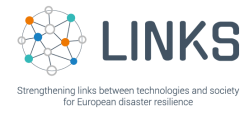
Nathan Clark and Chiara Fonio, Vrije Universiteit Amsterdam
The LINKS Framework is the beating heart of the project. It has the ambition of governing the diversity around the uses of social media and crowdsourcing (SMCS) by providing knowledge and learning materials such as scientific methods, guidelines and procedures; policy documents; practical tools and games to involve the local communities; good and best practices on trainings for different stakeholders (e.g. crisis communication management via SMCS for practitioners); and catalogues of tools and filtering options to make sense of the sheer amount of information shared in SMCS etc.
Far from being conceived as a static repository of knowledge, the Framework will be tested and refined in four European countries (Denmark, Germany, Italy and The Netherlands) and in the frame of five different hazard scenarios (flooding, drought, terrorism, earthquakes and industrial hazards) during the project lifetime. Moreover, relevant stakeholders’ groups will have the opportunity to actively contribute to the knowledge included in the Framework by adding content and by sharing their experiences in applying it. Indeed, stakeholders can engage with the knowledge in the Framework in different ways.
The learning materials will be made available in the Framework through the LINKS Community Center (LCC) and will be accessible according to the objectives of different stakeholders’ groups (such as, researcher, practitioners, policy makers, citizens). It can be foreseen to structure the learning materials along different lines for instance related to themes (e.g. inclusiveness, vulnerability, crisis and risk communication, disaster community technologies (DCTs); hazards and phases of disaster management (e.g. prevention, preparedness, response and recovery).
Stakeholders will be able to openly explore, compare and contribute to all the diverse knowledge within the LINKS Framework and/or, follow specific “learning paths” based on the goals of their organisation and situational context (e.g. institutional, cultural, hazard, etc.). The learning paths will also contribute to a primary objective of the project, namely producing sustainable advance learning on SMCS in disasters to strengthen societal resilience. This entails a maintainable and evolving collection of knowledge produced for and by relevant stakeholders. It involves double and triple loop learning processes, where stakeholders can gain, develop, and implement new knowledge through learning loops, which allow them to reflect on how and if the learning is being translated into meaningful changes within their organisations.
The LINKS Framework and LCC are envisaged to enable these dynamic learning processes so that the knowledge in LINKS grows during and after the end of the project. Ultimately, it will also serve the wider crisis management community by bringing multidisciplinary stakeholders together around the uses of SMCS in disasters.

